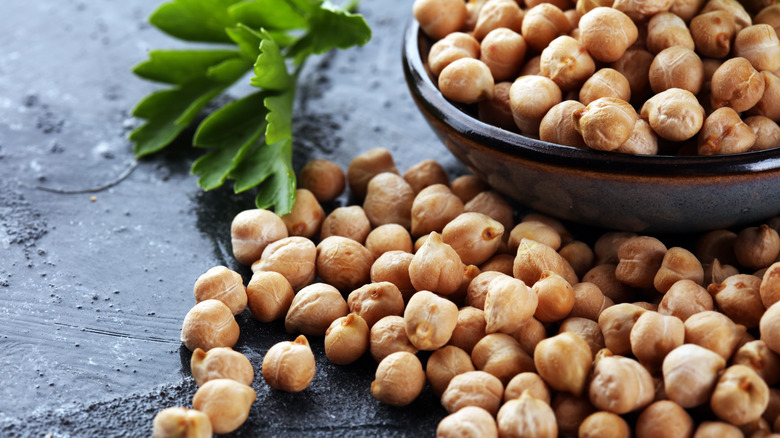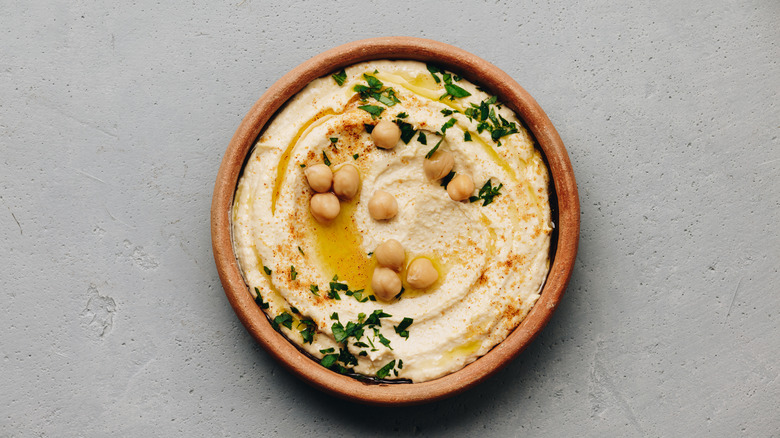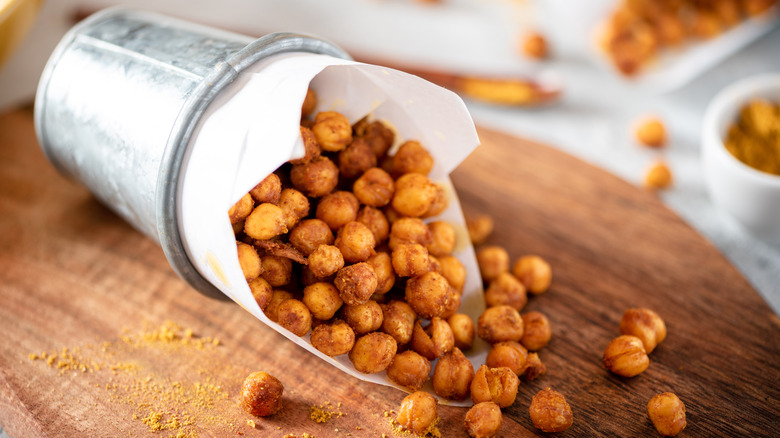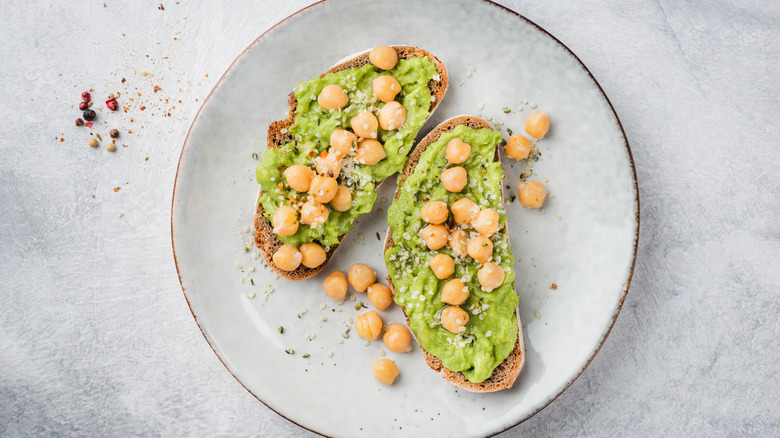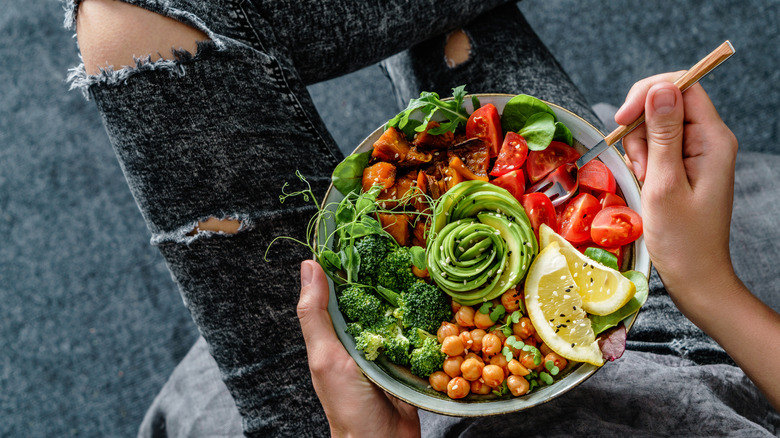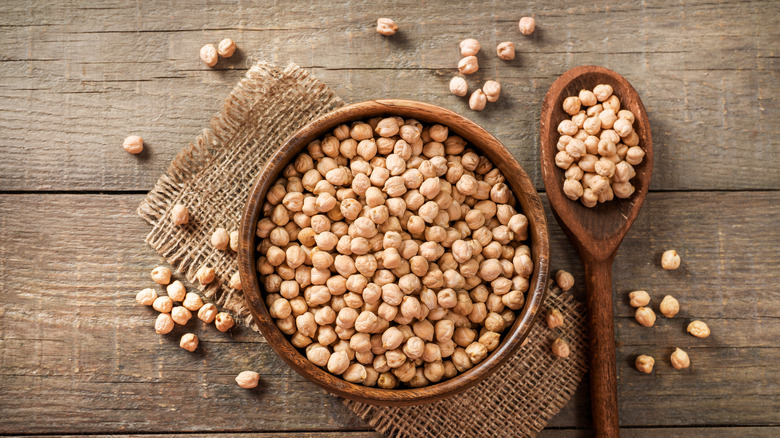Here's What Happens To Your Body When You Eat Chickpeas Every Day
Chickpeas, also commonly known as garbanzo beans, are a healthy member of the legume family. This protein-dense little pea is popular these days as a plant-based protein alternative in many vegan and vegetarian dishes, but it is hardly a modern health food. In fact, the chickpea is one of the earliest cultivated legumes in human history, with the first evidence of it appearing as far back as 7,500 years ago, according to Tori Avey.
The chickpea first appeared in the Middle East, in what is now modern-day Turkey, over 7,000 years ago, but the first documented written record of it came from France around 800 AD, and it was written by none other than the king of the Franks, Charlemagne, Tori Avey notes. The popularity of the chickpea spread from France through other parts of Europe, and is now a common ingredient in many favorite dishes like hummus, salad, stews, and Buddha bowls all over the world, from India and the Mediterranean to the United States.
If you want to incorporate more chickpeas into your diet, here's what you should know.
Chickpeas are low in calories and high in nutrients
With its mild, pleasing taste and loads of health benefits, it is no wonder why the chickpea is a favorite food for so many. Like peas, lentils, and other healthy legumes, chickpeas are a part of a food group known as "pulses," which are basically any edible seeds that come from the legume family, per pulses.org. Chickpeas are a great, low-calorie way to pack a substantial amount of nutrients into your diet, and provide many significant health benefits.
One ounce of chickpeas has just 46 calories, but contains high amounts of protein, fiber, and many essential nutrients like iron, folate, manganese, copper, and phosphorus, according to Healthline. Studies have even linked chickpea consumption to a lower body mass index, in large part because of their high amounts of fiber and protein. This can help promote a longer feeling of fullness, thus leading to a lowered appetite and reduced calorie consumption, therefore helping individuals maintain a healthy body weight and lowered risk of obesity.
Chickpeas may help protect against cancer
This protein-packed pulse also boasts a healthy dose of fiber, which is another important nutrient essential for good health. According to WebMD, chickpeas don't contain just any fiber, but boast a high amount of an important soluble fiber called raffinose. Because it is soluble, it is broken down more slowly, which can help improve gut health, regularity, and digestion.
But that's not all chickpeas can do. Studies have shown they may even help lower the risk of developing cancer. Studies have demonstrated that eating a diet high in fiber has also been linked to a reduced risk of cancer, while the antioxidants found in chickpeas further boost their cancer-fighting properties by helping to protect against cell damage. They also contain an important plant compound called saponins, which may inhibit tumor growth, per Healthline.
This nutrient-rich superfood also contains other essential nutrients, like iron and calcium, which help improve bone health, as well as choline, which helps improve cognitive function, according to Medical News Today.
Eating chickpeas has been linked to improved cardiovascular health
Eating a diet high in chickpeas has been shown to help improve heart health. This is because they contain the important nutrients magnesium and potassium, both of which are key to maintaining a healthy heart. They have been shown to help prevent high blood pressure, which is one of the leading risk factors when it comes to developing heart problems, according to Healthline. Additionally, the soluble fiber in chickpeas also helps lower the body's levels of bad LDL cholesterol, which decreases the risk of heart disease.
"We have a lot of room in our diets for increasing our pulse intake to derive the cardiovascular benefits," Dr. John Sievenpiper of St. Michael's Hospital's Clinical Nutrition and Risk Factor Modification Centre, who led a study on the positive impact of pulses on cholesterol, explained to Science Daily. "Pulses already play a role in many traditional cuisines, including Mediterranean and South Asian. As an added bonus, they're inexpensive. Since many pulses are grown in North America, it's also an opportunity to buy and eat locally and support our farmers."
Chickpeas are a healthy choice for people with diabetes
Chickpeas have also been shown to be especially beneficial for people with diabetes. According to a study published in Archives of Internal Medicine, participants who consumed at least one cup of legumes like chickpeas each day showed both lowered levels of hemoglobin A1c values and a decrease in blood pressure by the end of the study, per Cooking Light.
Chickpeas are a food with a low glycemic index, which means that it takes a while for the body to digest them. This helps stop insulin levels from spiking and stabilizes the body's blood glucose levels, thus preventing a blood sugar spike, according to WebMD. They have also been shown to help people who suffer from type one diabetes because they help reduce inflammation in the body, according to Medical News Today. While chickpeas are a good dietary choice for diabetics, making chickpeas a part of your regular diet may also lower the risk of developing type two diabetes and help prevent the onset of the disease.
Eating too many chickpeas can have drawbacks
However, there is one downside to eating chickpeas every day. The high fiber and carbohydrate content can sometimes lead to uncomfortable gas, bloating, and intestinal distress. This can be worsened in people who already suffer from digestive issues, such as IBS, so those with sensitive systems should take extra care when it comes to their chickpea consumption. Eat This Not That recommends introducing chickpeas to your diet slowly, especially if you have not previously eaten lots of legumes, and portioning them out into smaller servings in order to reduce the risk of developing uncomfortable digestive issues.
Chickpeas can also be harmful if they are eaten raw. While most people purchase their chickpeas dried or in a can, raw chickpeas can contain toxins that are difficult to digest and may be harmful unless they are cooked off, according to Medical News Today. Rinsing chickpeas before eating is important, as it can help eliminate these substances and reduce the potential symptoms of intestinal discomfort.
